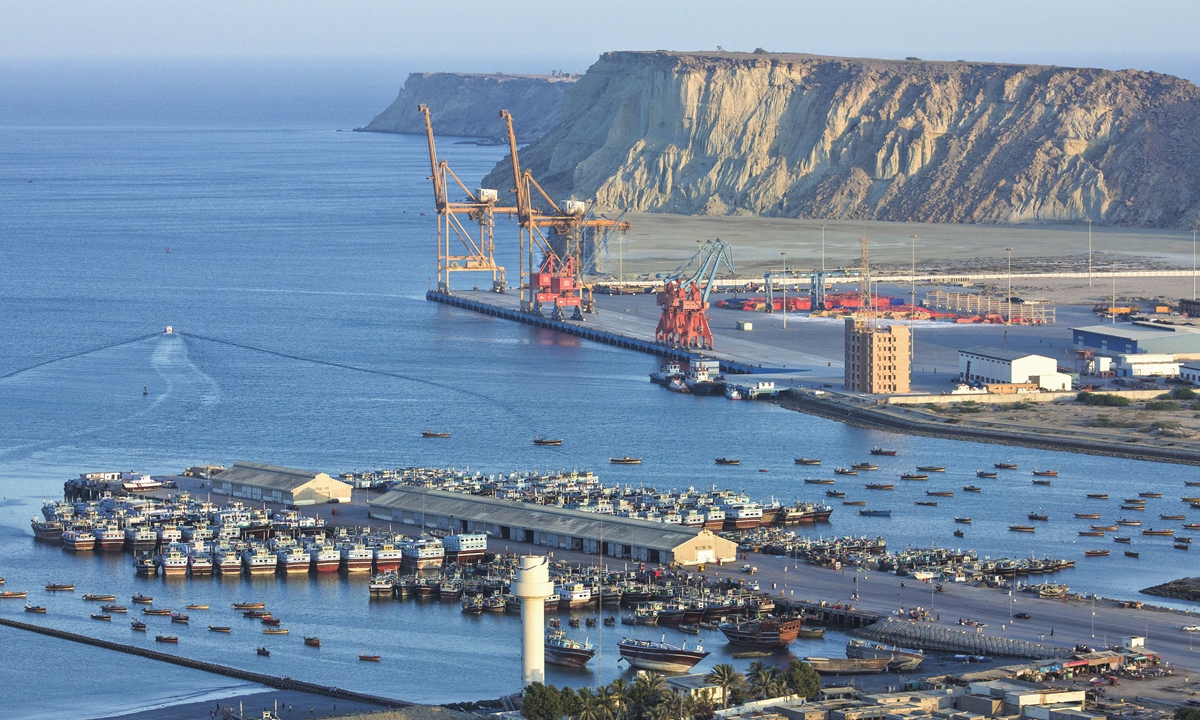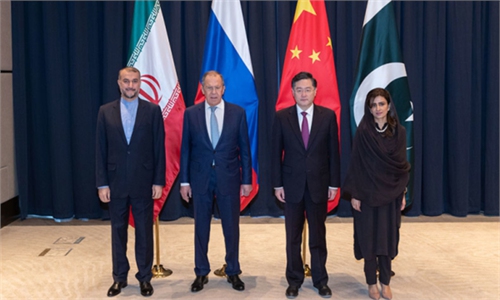China, Pakistan, Afghanistan support extension of CPEC project to Afghanistan, promote trilateral economic cooperation

A view of the Gwadar port of Pakistan Photo: VCG
Foreign ministers of China, Afghanistan, and Pakistan have agreed to enhance trilateral cooperation in economy, poverty reduction, and agriculture, and plan to extend the project of China-Pakistan Economic Corridor (CPEC) to Afghanistan during the China-Afghanistan-Pakistan Foreign Ministers' Dialogue on Sunday.The three countries agreed to advance cooperation on the Belt and Road Initiative (BRI), promote connectivity among the three neighbors, and improve cross-border trading systems, with a view to enhancing trilateral economic integration and achieving sustainable development, according to the Xinhua News Agency.
The meeting came after a dialogue which Chinese State Councilor and Foreign Minister Qin Gang and Pakistani Foreign Minister Bilawal Bhutto Zardari hailed CPEC as an example of the BRI at the 4th round of the Foreign Minister-level Pakistan-China Strategic Dialogue held in Islamabad on Saturday.
Welcoming the completion of a decade of the CPEC in 2023, the two sides hailed CPEC as a shining good example of Belt and Road cooperation which has accelerated socio-economic development, job creation and improvement of people's livelihoods in Pakistan, according to the official website of the Foreign Ministry of China.
The two sides agreed to continue their humanitarian and economic assistance for the Afghan people and enhance development cooperation in Afghanistan, including through extension of the CPEC infrastructure project to Afghanistan.
The CPEC has boosted economic development in both China and Pakistan since it was proposed 10 years ago. Afghan officials are seeking to use the initiative to advance much needed infrastructure and economic development in the country, Qian Feng, director of the research department at the National Strategy Institute at Tsinghua University, told the Global Times on Sunday.
"One of the direct benefits brought by the CPEC to Afghanistan is cooperation linked to infrastructure construction and transport connectivity. In addition, China's advanced agriculture and poverty reduction experience could be shared with Afghanistan to fundamentally improve living standards there," Qian added.
As a landlocked country, Afghanistan mainly relies on Pakistani ports for international trade. However, due to government regulations, trade between Pakistan and Afghanistan mainly takes place via the ports of Karachi and Qasim, which poses some problems such as protracted time and higher cost.
Afghanistan has become the first among landlocked Central Asian countries to benefit from using the Chinese-invested Gwadar Port in Pakistan for future cross-border trade.
After several rounds of consultations with relevant authorities in Pakistan, Gwadar Port finally obtained an e-export trade license with Afghanistan in the second half of 2019, according to China's Ministry of Commerce.
In 2020, Afghanistan imported 43,000 tons of fertilizer via the port, contributing to its agricultural development.
However, Qian said that security concerns would be one of the outstanding challenges facing the CPEC project extension to Afghanistan, adding that companies from the three countries can look for other cooperation opportunities in advance in the region.
Qian noted that the current territorial dispute between Pakistan and Afghanistan is a barrier to regional cooperation, but the CPEC extension to Afghanistan may encourage regional communication and help resolve their dispute.
Global Times


